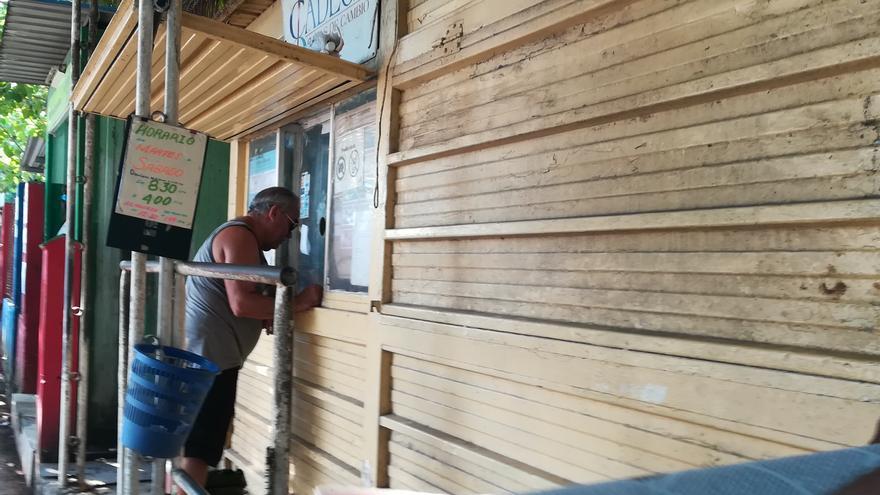
![]() 14ymedio, Marcelo Hernandez, Havana, 18 December 2018 — All of the employees at the state operated currency exchanges (known as Cadecas), will receive 40 Cuban pesos (CUP) less in salary in December, according to reports from several employees speaking to 14ymedio. The amount deducted will be used — according to what they’ve been told — to repair the premises where they work, which have deteriorated over the years due to lack of investment.
14ymedio, Marcelo Hernandez, Havana, 18 December 2018 — All of the employees at the state operated currency exchanges (known as Cadecas), will receive 40 Cuban pesos (CUP) less in salary in December, according to reports from several employees speaking to 14ymedio. The amount deducted will be used — according to what they’ve been told — to repair the premises where they work, which have deteriorated over the years due to lack of investment.
Created in 1996, for years the Cadecas have been the places most visited by Cubans when they want to sell foreign currency or exchange Cuban pesos (CUP) and convertible pesos (CUC).
“This month they are deducting 40 pesos from each employee because they are going to use that money to improve the situation where we work,” an employee of an exchange office on Belascoaín Street in Havana told this newspaper. “With that money we can have a bathroom because we have to be here eight hours every day and we do not have bathrooms.”
The Cadecas are the state centers in Cuba that earn the most money for their services. The Government imposes a 13% tax on the exchange of dollars to convertible pesos, with the customer receiving only 0.87 CUC for each dollar instead of the official rate which is 1 CUC per dollar.
In a country where remittances received from abroad totaled 3.354 billion dollars in 2015, according to The Havana Consulting Group (THCG), the Cadecas have become the main recipient of this currency, which is also changed in the informal market.
“With all the money we move, we have to work under very difficult conditions,” Jose Ignacio, a former Cadeca guard with ten years experience in security matters, explained to 14ymedio. “The premises are not safe, technology constantly suffers failures and digital communications with the bank are not stable,” he says.
However, it is in the issue of “attention to the workers” where there are more unaddressed issues, says José Ignacio. “The lunch they give us is very bad, transportation to the premises fails all the time and we do not have access to a bathroom to meet our needs,” he laments.
However, the officials of the Currency Exchanges insist that these premises have become less important because more and more state stores now accept payment in both currencies, CUC and CUP, thus taking away the exchange business of the Cadecas.
Dozens of Cadeca workers have joined together and sent a letter to the State Council complaining about the deduction from their salary this month. In the letter they note the strategic nature of the sector in which they work and recommend the Government annul the decision.
“Most of the money that moves in our country passes through these hands,” explains Loreta, a cashier in a Cadeca housed in a metal container structure located in Havana’s El Vedado district. “Every day I count thousands and thousands of dollars or convertible pesos, but when they pay me I receive less than 40 CUC (monthly),” she says, outraged.
“If this were a cooperative it would not be bad if we put part of our salary to the common benefit, but we are employees of a state company and this is a very difficult month to take away part of our salary, it is not right nor is it the time,” the worker points out.
The employees of the Cadecas are considering appealing to independent unions. “What we are asking for is nothing extraordinary, only that our salary is respected and that the money that should go into our pockets is not used for something that the State must assume,” Loreta adds.
A copy of the letter sent to the Council of State will also be sent to the Cuban Workers Center (CTC), the only union allowed in the country. In July of last year, the secretary-general of the CTC, Ulises Guilarte de Nacimiento, acknowledged that salaries on the island are “insufficient” to meet the needs of the worker, which causes “apathy,” “disinterest” and “important labor migration.”
“The trade union movement demands confidence from its workers, we have to resist a little more to finish solving this problem, which for us continues to be a priority to solve in the shortest time possible,” Guilarte emphasized months later.
_____________________________
The 14ymedio team is committed to serious journalism that reflects the reality of deep Cuba. Thank you for joining us on this long road. We invite you to continue supporting us, but this time by becoming a member of 14ymedio. Together we can continue to transform journalism in Cuba.
